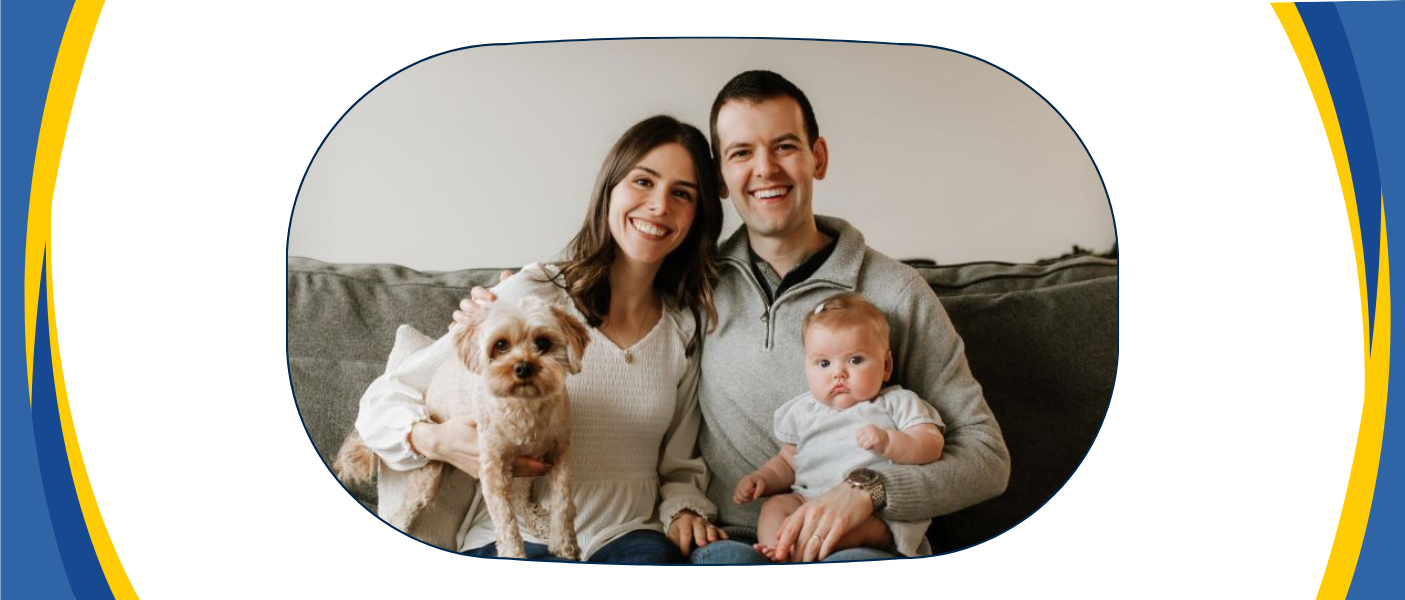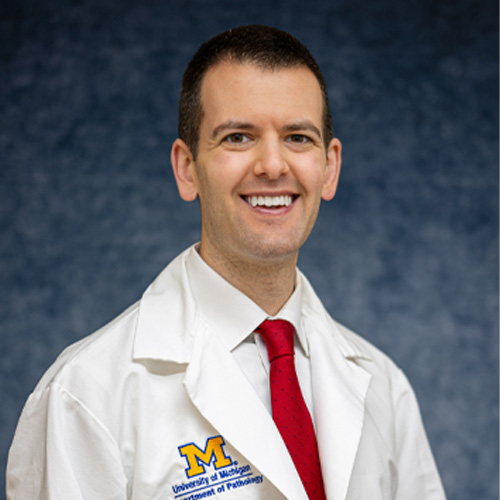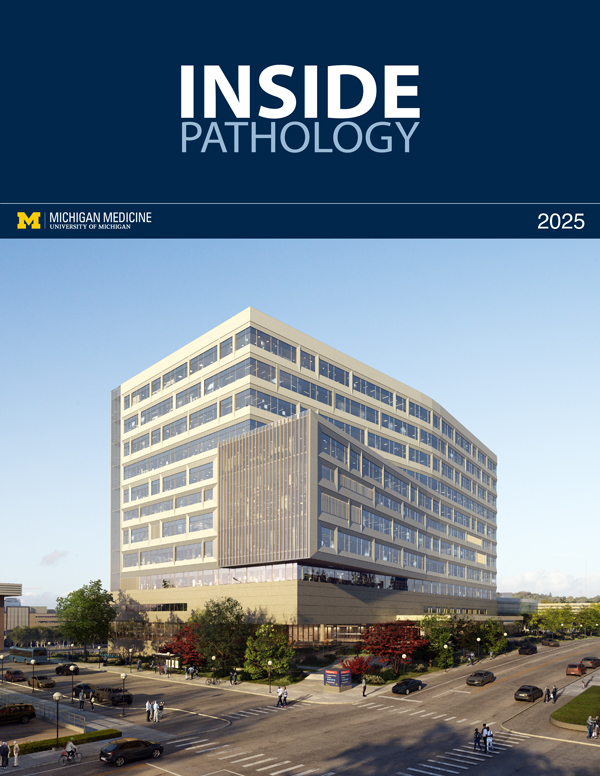

"I thought if I wanted to have a career in biomedical science, pathology would be a great fit. It would allow me to think about the clinical problems I was interested in and have a good way to conduct research that ties back to medicine."
 Tell us about your background so we can get to know you.
Tell us about your background so we can get to know you.
I grew up in a small town called Northborough, Massachusetts. It is located halfway between Boston and Worcester. After high school, I went to a liberal arts college in Massachusetts before going to Vanderbilt University in Nashville, Tennessee, for my MD-PhD. While I was there, I met my wife, Katherine, who is a speech pathologist, and we now have an almost two-year-old daughter, Lila. At Vanderbilt, my PhD focused on cancer biology, and I researched clonal hematopoiesis.
What motivated you to pursue a medical career?
I have always had medicine in the back of my mind because my mom is a physician. When I went to college, though, I thought I was going on a different trajectory. I was initially pursuing economics and thought I would become an Economics professor. While I was doing that, I realized that I wanted to have a more tangible positive impact on people. I thought medicine would be a great way to do that. There are many fascinating problems that connect to helping people. Toward the end of my undergraduate program, I learned about the MD-PhD track and becoming a physician-scientist. I took two years off after I graduated and worked as a research technician in a hematology-oncology lab under Dr. Benjamin Ebert at Brigham and Women’s Hospital. This helped me decide that becoming a physician-scientist was the right path for me.
After two years working in the lab, I joined the MD-PhD program at Vanderbilt University School of Medicine. My PhD research focused on clonal hematopoiesis, but from a different angle than in the Ebert Lab. I find the blood to be very interesting. There is so much going on there, and it ties into all the organ systems. Many human diseases connect back to the blood, so I think it is an exciting field to be in. At Vanderbilt, my mentor was Dr. Michael Savona, and I enjoyed working with the members of the Savona lab and with our excellent collaborators.
How did you decide on Pathology?
I had some exposure to pathology along the way. When I was at Brigham and Women’s Hospital, the postdoc I was working most closely with was a scientist and pathologist. Then, many of my medical school courses were taught by pathologists. When I was working on my PhD, I began to give more thought to which medical specialty I wanted to pursue. I was having interactions with pathologists, and I thought that if I wanted to have a career in biomedical science, pathology would be a great fit. It would allow me to think about the clinical problems I was interested in and have a good way to conduct research that ties back to medicine.
 You ranked Michigan highly for the Match. What attracted you to our program?
You ranked Michigan highly for the Match. What attracted you to our program?
Several factors made Michigan the right fit for us. First, I was looking for an academically strong program that had different research opportunities, had a lot of physician-scientists, and had a physician-scientist training program. I found all of that in the University of Michigan Pathology Department. Another significant consideration was for my wife and daughter. We were looking for a good place to live, and Ann Arbor checked all the boxes. It has a lot of great family-friendly activities, a good school system, different cultural events, and things to do outside of school. It is an excellent place for families. In addition, there were multiple job opportunities for my wife between the school systems, private practice, or the hospital settings. Ann Arbor offers many opportunities for her career.
Tell us about your time as a resident so far. Is there anything you would like to highlight?
I am one of the Clinical Pathology-only residents, so I started with a six-week rotation in transfusion medicine to be sure I get situated and truly understand the workflows in transfusion medicine. That was a very good experience. It was cool to see how everything works here at Michigan versus where I went for medical school. There are similarities, but also a lot of differences. The faculty, other residents, the fellow that we worked with, and all the staff at the blood bank and apheresis unit are just excellent and very knowledgeable. They are very team-oriented, which makes for a very enjoyable experience working there. I am now starting my second rotation in hematopathology, but I’m only 2 days into that, so I guess there is more to come. I’m glad I have this rotation up front so I can see how it is done and meet some people.
What brings you the most joy in your work and life?
The thing that brings me the most joy in my work is being able to learn things that help people. I love figuring out how the world works. I guess that’s why I’m in research, as well as medicine. I will be able to have a career where I learn about things and then can apply them to benefit other people’s lives. It is the perfect career for me.
In my personal life, the thing I love to do is spend time with my family. I also enjoy reading for pleasure, but since my daughter was born, I’ve gotten into audiobooks because they are a little bit easier to digest on the go. I also like to get outside and go for runs, to be in nature. Lastly, I’m happy to be at a place where other residents enjoy playing board games.
Are there any mentors you would like to mention? If so, how did they impact your life?
I’ve been fortunate to find great mentors at each stage of my training. In Boston, I learned so much from Dr. Ebert and the postdoc I was working with, Dr. Sidd Jaiswal. And in the Vanderbilt Department of Pathology, I was lucky to be connected with Dr. Garrett Booth. He is a transfusion medicine physician and has been incredibly supportive of me as a trainee and as a person. He is super thoughtful and encouraging of my interests in pathology. Those are just a few of the people who have really helped me along my career and have also been important in my personal life.
What is your strategy for finding balance between training and your other interests?
One big thing was to find a program where balance would be possible. Michigan has a lot of strong support structures for the residents that can help us find balance between work and life. The culture of the program encourages this. The faculty are very approachable, and their interactions with the residents are very respectful. Residents feel able to advocate for themselves and ask for the things they need. And the space and how it is structured also play a role. We have our own individual desks, a resident common area where different snacks are brought in, and our own resident library. There are many ways the program facilitates the ability of residents to do effective work, so that we can advance clinical care and our learning in a way that preserves our bandwidth. Because we’re able to efficiently accomplish the things I need to do at work, this enables us to spend time outside of work doing other things.
What advice would you give students considering a career as a physician scientist in pathology?
If a student were interested in pursuing an MD-PhD career, I would say that they need to take time to understand their own priorities and what motivates them. A career in biomedical science requires a lot of dedication to the work, and it is a long training path. Make sure it is something that fits well with your personality and your work style. Second, you need to find mentors in several different spaces. You will need people to help you with research, clinical training, and for your personal life and development.
What are some fun facts about you that we could share?
One fun fact is that I am studying the German language because I am currently applying for German dual citizenship. Another fun fact is that I did my very first bike race, the Clarksville Century, with my wife while she was pregnant. It was a 100-mile bike race over mostly flat terrain. Cycling is my wife’s thing, but I wanted to make sure she had somebody with her during that race. It was definitely a challenge!
Welcome to Michigan, Alex! We are thrilled you chose to join our program and look forward to watching you grow as a physician-scientist.
 ON THE COVER
ON THE COVER
Breast team reviewing a patient's slide. (From left to right) Ghassan Allo, Fellow; Laura Walters, Clinical Lecturer; Celina Kleer, Professor. See Article 2014Department Chair |

newsletter
INSIDE PATHOLOGYAbout Our NewsletterInside Pathology is an newsletter published by the Chairman's Office to bring news and updates from inside the department's research and to become familiar with those leading it. It is our hope that those who read it will enjoy hearing about those new and familiar, and perhaps help in furthering our research. CONTENTS
|
 ON THE COVER
ON THE COVER
Autopsy Technician draws blood while working in the Wayne County morgue. See Article 2016Department Chair |

newsletter
INSIDE PATHOLOGYAbout Our NewsletterInside Pathology is an newsletter published by the Chairman's Office to bring news and updates from inside the department's research and to become familiar with those leading it. It is our hope that those who read it will enjoy hearing about those new and familiar, and perhaps help in furthering our research. CONTENTS
|
 ON THE COVER
ON THE COVER
Dr. Sriram Venneti, MD, PhD and Postdoctoral Fellow, Chan Chung, PhD investigate pediatric brain cancer. See Article 2017Department Chair |

newsletter
INSIDE PATHOLOGYAbout Our NewsletterInside Pathology is an newsletter published by the Chairman's Office to bring news and updates from inside the department's research and to become familiar with those leading it. It is our hope that those who read it will enjoy hearing about those new and familiar, and perhaps help in furthering our research. CONTENTS
|
 ON THE COVER
ON THE COVER
Director of the Neuropathology Fellowship, Dr. Sandra Camelo-Piragua serves on the Patient and Family Advisory Council. 2018Department Chair |

newsletter
INSIDE PATHOLOGYAbout Our NewsletterInside Pathology is an newsletter published by the Chairman's Office to bring news and updates from inside the department's research and to become familiar with those leading it. It is our hope that those who read it will enjoy hearing about those new and familiar, and perhaps help in furthering our research. CONTENTS
|
 ON THE COVER
ON THE COVER
Residents Ashley Bradt (left) and William Perry work at a multi-headed scope in our new facility. 2019Department Chair |

newsletter
INSIDE PATHOLOGYAbout Our NewsletterInside Pathology is an newsletter published by the Chairman's Office to bring news and updates from inside the department's research and to become familiar with those leading it. It is our hope that those who read it will enjoy hearing about those new and familiar, and perhaps help in furthering our research. CONTENTS
|
 ON THE COVER
ON THE COVER
Dr. Kristine Konopka (right) instructing residents while using a multi-headed microscope. 2020Department Chair |

newsletter
INSIDE PATHOLOGYAbout Our NewsletterInside Pathology is an newsletter published by the Chairman's Office to bring news and updates from inside the department's research and to become familiar with those leading it. It is our hope that those who read it will enjoy hearing about those new and familiar, and perhaps help in furthering our research. CONTENTS
|
 ON THE COVER
ON THE COVER
Patient specimens poised for COVID-19 PCR testing. 2021Department Chair |

newsletter
INSIDE PATHOLOGYAbout Our NewsletterInside Pathology is an newsletter published by the Chairman's Office to bring news and updates from inside the department's research and to become familiar with those leading it. It is our hope that those who read it will enjoy hearing about those new and familiar, and perhaps help in furthering our research. CONTENTS
|
 ON THE COVER
ON THE COVER
Dr. Pantanowitz demonstrates using machine learning in analyzing slides. 2022Department Chair |

newsletter
INSIDE PATHOLOGYAbout Our NewsletterInside Pathology is an newsletter published by the Chairman's Office to bring news and updates from inside the department's research and to become familiar with those leading it. It is our hope that those who read it will enjoy hearing about those new and familiar, and perhaps help in furthering our research. CONTENTS
|
 ON THE COVER
ON THE COVER
(Left to Right) Drs. Angela Wu, Laura Lamps, and Maria Westerhoff. 2023Department Chair |

newsletter
INSIDE PATHOLOGYAbout Our NewsletterInside Pathology is an newsletter published by the Chairman's Office to bring news and updates from inside the department's research and to become familiar with those leading it. It is our hope that those who read it will enjoy hearing about those new and familiar, and perhaps help in furthering our research. CONTENTS
|
 ON THE COVER
ON THE COVER
Illustration representing the various machines and processing used within our labs. 2024Department Chair |

newsletter
INSIDE PATHOLOGYAbout Our NewsletterInside Pathology is an newsletter published by the Chairman's Office to bring news and updates from inside the department's research and to become familiar with those leading it. It is our hope that those who read it will enjoy hearing about those new and familiar, and perhaps help in furthering our research. CONTENTS
|
 ON THE COVER
ON THE COVER
Rendering of the D. Dan and Betty Khn Health Care Pavilion. Credit: HOK 2025Department Chair |

newsletter
INSIDE PATHOLOGYAbout Our NewsletterInside Pathology is an newsletter published by the Chairman's Office to bring news and updates from inside the department's research and to become familiar with those leading it. It is our hope that those who read it will enjoy hearing about those new and familiar, and perhaps help in furthering our research. CONTENTS
|

MLabs, established in 1985, functions as a portal to provide pathologists, hospitals. and other reference laboratories access to the faculty, staff and laboratories of the University of Michigan Health System’s Department of Pathology. MLabs is a recognized leader for advanced molecular diagnostic testing, helpful consultants and exceptional customer service.